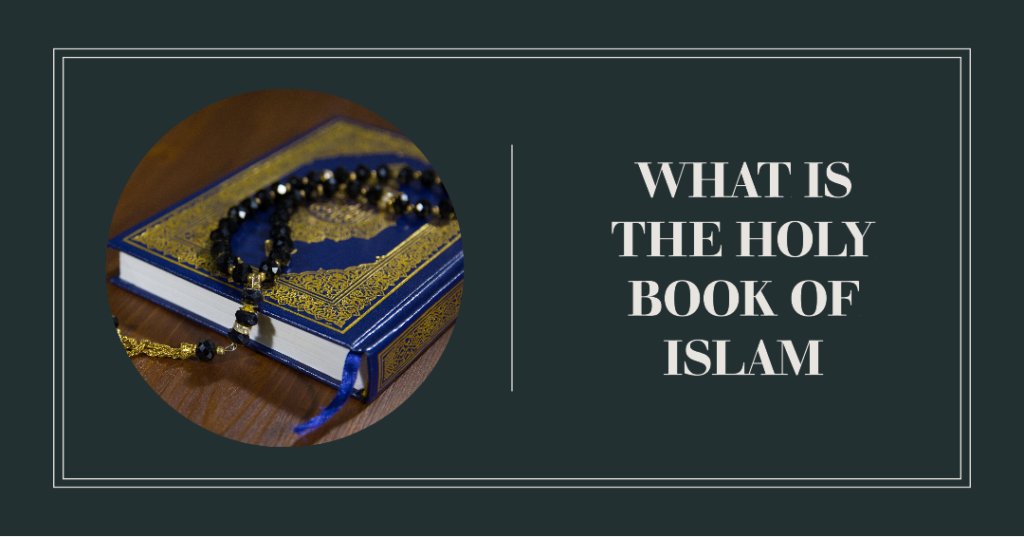Exploring the Holy Book of Islam
In the vast tapestry of world religions, Islam stands out as one of the most prominent and widely followed faiths. Central to this religion is its holy book, a repository of wisdom, guidance, and principles that shape the lives of millions of believers. This article delves into the heart of Islam by exploring its primary scripture, uncovering its teachings, and understanding its broader significance.
Table of Contents
- Introduction
- Unveiling the Name: What Is the Sacred Book of Islam Called?
- A Source of Divine Wisdom: Understanding the Significance of the Holy Book
- Islamic Doctrine: Foundational Tenets and Beliefs
- The Quran’s Influence on Daily Life
- The Quran and Modern Society: Relevance and Application
- Conclusion

Introduction
Islam, with its rich history and profound impact, draws its principles from the teachings of a sacred text. This article journeys through the various facets of this holy book, shedding light on its teachings and its role in shaping Islamic doctrine.
Unveiling the Name: What Is the Sacred Book of Islam Called?
The sacred text of Islam is known as the Quran, which translates to “recitation” in Arabic. Its eloquent verses serve as a bridge between humanity and the divine, offering insights into the purpose of existence and the path to righteousness.
A Source of Divine Wisdom: Understanding the Significance of the Holy Book
The Quran is more than just a book; it’s a spiritual compass that provides direction for every aspect of a Muslim’s life. It covers a wide array of subjects, from morality and ethics to social justice and spirituality.
The Teachings of Compassion and Humanity
Central to the Quran’s teachings is the call for compassion and empathy towards all living beings. It emphasizes the importance of treating others with kindness and respect, fostering a sense of unity and understanding among diverse communities.
Islamic Doctrine: Foundational Tenets and Beliefs
The Quran outlines the core beliefs of Islam, including the belief in one God (Allah), the importance of prayer (Salah), the act of giving (Zakat), fasting during Ramadan (Sawm), and the pilgrimage to Mecca (Hajj). These pillars provide a framework for leading a virtuous and fulfilling life.
The Path to Enlightenment: Studying the Holy Book of Islam
Studying the Quran is not merely an intellectual pursuit; it’s a spiritual journey that leads to enlightenment. Muslims engage in its recitation, reflection, and interpretation to deepen their understanding of its teachings.
The Quran's Influence on Daily Life
The teachings of the Quran extend to every aspect of a Muslim’s daily routine. From waking up in the morning to interacting with others and making ethical choices, the Quran offers guidance on how to lead a life aligned with divine principles.
Interpreting the Quran: Diversity in Understanding
The Quran’s verses can be understood on various levels, allowing room for interpretation and reflection. Scholars and theologians offer insights into its meaning, leading to a diverse tapestry of perspectives that contribute to the richness of Islamic thought.
Preservation of the Sacred Text: A Remarkable Feat
The Quran’s preservation is nothing short of remarkable. Its oral transmission through generations and meticulous written compilation have ensured that the text remains unaltered, making it one of the most well-preserved ancient scriptures.111
Muslim Holy Book in Comparative Religions
Exploring the teachings of the Quran in the context of other religious scriptures reveals both shared values and unique perspectives. Such comparative analysis promotes interfaith dialogue and understanding.
The Quran and Modern Society: Relevance and Application
Despite being over a millennium old, the Quran’s teachings continue to resonate in the modern world. Its emphasis on justice, equality, and ethical conduct provides a foundation for addressing contemporary challenges.
Addressing Misconceptions and Stereotypes
The Quran has at times been subject to misconceptions and misinterpretations. Engaging with the text directly, rather than relying on hearsay, is essential to dispel misunderstandings and promote accurate understanding.
Embracing the Beauty of Diversity: Unity through the Quran
The Quran celebrates human diversity as a sign of divine wisdom. Its teachings encourage unity among different cultures and backgrounds, emphasizing that all are equal in the eyes of God.
Conclusion
In conclusion, the Quran stands as a timeless guide that continues to shape the lives of Muslims around the world. Its teachings of compassion, ethics, and spirituality resonate across generations and cultures, offering a path towards a more enlightened and harmonious world. We offer different courses at learn Quran academy, so you can easily visit us.
Frequently Asked Questions(FAQs)
Q: What is the primary message of the Quran?
The primary message of the Quran revolves around monotheism, ethical living, and compassion for all beings.
Q: How do Muslims approach the study of the Quran?
Muslims approach the study of the Quran with reverence, engaging in recitation, reflection, and seeking guidance from scholars.
Q: Can the Quran’s teachings be applied to modern challenges?
Absolutely, the Quran’s teachings provide a moral compass that is highly relevant to addressing contemporary societal challenges.
Q: How does the Quran promote unity among diverse communities?
The Quran emphasizes the common origin of humanity, fostering unity through its teachings of equality and respect.
Q: Where can I learn more about the Quran’s teachings?
Access Now: Learn Quran Academy
